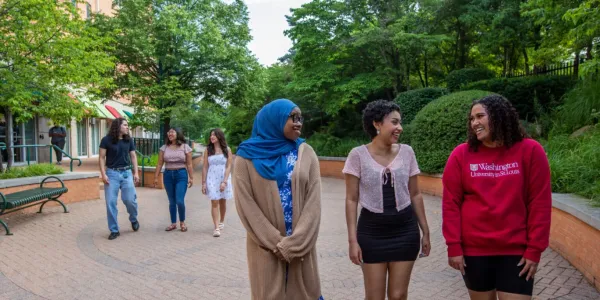A $1.3 million grant from the United Kingdom Arts and Humanities Research Council will enable an international team of researchers to conduct the first study of Holocaust literature at scale.

As the final survivors of the Holocaust pass away, the Nazi genocide of European Jews is slipping out of living memory. Yet antisemitic rhetoric persists and indeed surges internationally, as do ignorance, trivialization, and denial of the Holocaust. A new multi-year collaboration between researchers at the University of Leeds and Washington University seeks to reconsider the history of and emerging developments in Holocaust literature at an acute moment in history. The project is funded by a $1.3 million grant from the United Kingdom Arts and Humanities Research Council.
Together with lead investigator Stuart Taberner (University of Leeds), Erin McGlothlin, vice dean of undergraduate affairs and professor of German and Jewish studies, is convening a team of over 40 international researchers to produce a series of publications fundamentally rethinking the field of Holocaust narrative, a corpus of literature that encompasses many thousands of texts. Writers responded in real time to Hitler’s rise in power and the genocidal measures carried out by Nazi Germany and its allies, producing a large body of testimony, poetry, and fiction documenting the atrocities carried out by the Nazi regime. The field of Holocaust literature also examines works that focus on the aftermath of these events as well as their continued relevance for contemporary society and culture.
Literary responses to the Holocaust have significantly shaped global awareness of the Holocaust. While authors like Anne Frank, Elie Wiesel, and Primo Levi are household names, their works represent a small portion of a large archive of narrative responses to the genocide. These texts are written in dozens of languages and in numerous countries around the world.
“Up until this point, the analysis of individual texts has largely focused on the author’s own Holocaust experience, the authenticity of the representation, the moral response, the intergenerational transmission of trauma, or formal innovations,” said McGlothlin. “Our goal is to theorize Holocaust literature as a comprehensive literary system for the first time.”
“With our collaborative project, which will integrate the cutting-edge research of experts from around the world, we aim to set the tone for the scholarly discourse on the literature of the Holocaust for the next twenty-five years.”
As scholars have worked to identify more works of Holocaust literature, it has become clear that conventional ways of categorizing literature by genre, language, and nation of origin might be less useful in the context of a body of literature that by definition crosses national and generic borders. Taberner and McGlothlin aim to develop a new theoretical model of Holocaust literature at scale, doing justice to the number and diversity of existing texts and exploring the narrative representation of marginalized or underrepresented experiences of the genocide. In doing so, they plan to integrate insights from the recent theorization of postcolonial and world literatures as well as to trace the dynamic interaction between context, canon, and circulation.
McGlothlin and Taberner plan to publish the comprehensive multi-authored Cambridge History of Holocaust Literature, a pedagogical guide for the teaching of Holocaust literature, and numerous journal articles and to organize public-facing events. The grant will also fund three postdoctoral fellows for a period of 2.5 years, two at the University of Leeds and one in Washington University's Program in Comparative Literature. Together with McGlothlin and Taberner, this team of early-career scholars will design an iterative research process, in which contributors — including Anika Walke, associate professor of history, and Tabea Alexa Linhard, director and professor of global studies and professor of Spanish and comparative literature — will meet frequently online and at in-person workshops and conferences, resulting in cumulative dialogue rather than isolated studies.
“With our collaborative project, which will integrate the cutting-edge research of experts from around the world, we aim to set the tone for the scholarly discourse on the literature of the Holocaust for the next twenty-five years,” McGlothlin said. “This is not only a labor of love for Stuart and me. It also reflects our strong commitment to the future of Holocaust memory.”




